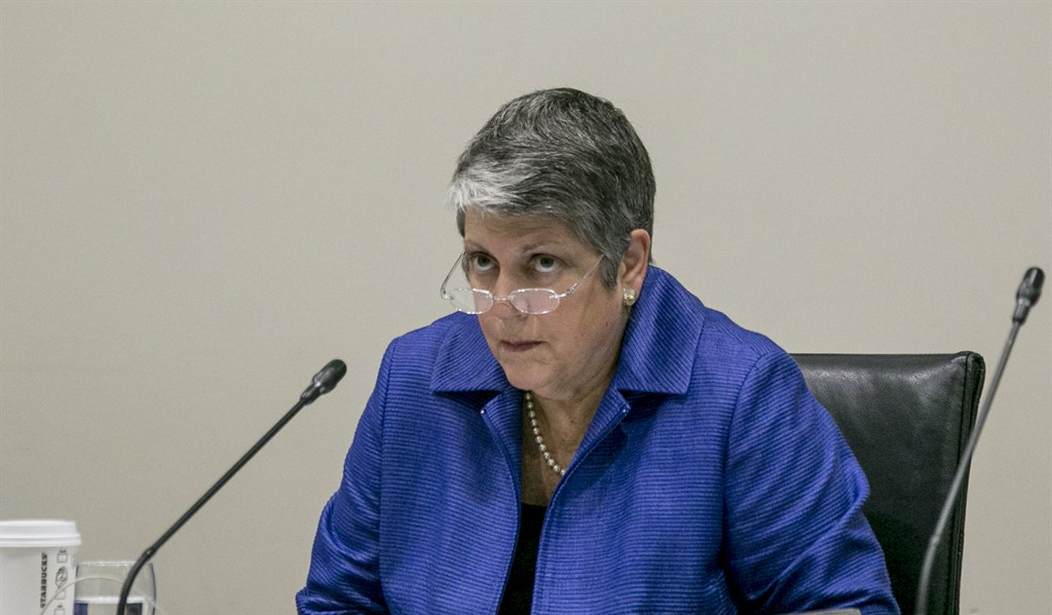A state audit released Tuesday concludes that the University of California Office of the President, led by former Obama administration DHS Secretary Janet Napolitano, hid away $175 million while paying excessive salaries to staff and raising tuition on students. Auditor Elaine Howle also says someone from Napolitano’s office interfered with questionnaires sent to various UC campuses as part of the audit. From the San Francisco Chronicle:
The UC Office of the President amassed millions in the secret reserve funds in part by overestimating how much it needed to run the 10-campus university system — and then spending less than budgeted, the audit said. From 2012 to 2016, the office sought increased funding based on the inflated estimates, not actual spending, according to Howle…
About $32 million of the $175 million that Howle’s audit found in the secret reserve came from campus assessment fees — money that the auditor said could have been spent on students and should be returned to the campuses.
Even as it accumulated the campus fees, Napolitano persuaded the Board of Regents to increase those fees in two of the four years audited, Howle said.
There are nearly 1,700 people working in the Office of the President. The audit notes that number is significantly higher than other similar offices. This chart makes the comparison. Note that the California State system has more than twice as many campuses and nearly twice as many students but manages to get by with 1/3 the amount of staff of the UC system:

In addition to having an outsized staff, the Office of the President was also paying significantly higher salaries than comparable state workers were earning, plus offering a special retirement plan, and other questionable expenses. From the LA Times:
The audit said: “10 executives in the Office of the President whose compensation we analyzed were paid a total of $3.7 million in fiscal year 2014-15 — over $700,000 more than the combined salaries of their highest paid state employee counterparts.”
On benefits, the Office of the President provided a regular retirement plan but also offered its executives a retirement savings account into which the office contributes up to 5% of the executives’ salaries—about $2.5 million over the past five years, the audit found.
“The Office of the President also spent more than $2 million for its staff’s business meetings and entertainment expenses over the past five years—a benefit that the State does not offer to its employees except in limited circumstances,” the audit said.
Given how bad this looks, perhaps it’s not surprising that Napolitano’s office interfered with the auditor’s efforts to investigate the situation. In order to gather information on how much the services being offered by the Office of the President were actually being used by the system’s 10 campuses and whether the campuses thought the cost of those services was reasonable, the auditor sent out two surveys to each campus. The auditor specifically asked the campus executives who received the surveys not to share them with the Office of the President. But that didn’t stop one of Napolitano’s deputies from interfering and arranging a call to manage the responses. From the report:
Although we explicitly asked each campus not to share its survey results with anyone outside of the campus, we learned in February 2017 that the Office of the President had requested campuses to send their survey responses to it and that the deputy chief of staff of the Office of the President (deputy chief of staff) organized a conference call with all campuses to discuss the survey and screened the surveys before the campuses submitted them to us…
When we compared the prescreened versions of the surveys to the versions the campuses subsequently submitted to us, we discovered trends that concerned us. Specifically, we found that the survey responses were changed in ways that made the Office of the President appear more efficient and effective. The most extensive changes were in the open-ended comments that campuses provided in response to our broad questions. Table 15 summarizes several examples of those changes. Further, after the Office of the President’s review, campuses also changed 13 ratings that we know of; 12 of these made the Office of the President look better. For example, in the prescreened version of its survey, San Diego stated that it was dissatisfied with the transparency regarding what the campus assessment pays for within the Office of the President. However, the survey we received stated that the campus was satisfied with the level of transparency. In addition, San Diego’s comments documenting concerns with the Office of the President’s budget process were deleted.
As a result of this clear effort to massage the data, the auditor determined the results were unusable:
Because of the Office of the President’s involvement, we believe that the survey results carry an unacceptably high risk of leading us and users of the survey results to reach incorrect or improper conclusions regarding the efficacy of the Office of the President’s operations. Auditing standards prohibit us from using such evidence as support for findings and conclusions.
For the record, Napolitano has denied the claims made in the audit. She says the reserve fund was only $38 million which was set aside as a reserve in case of emergency. But needless to say, all of this stinks to high heaven. Howle, the auditor, told the SF Chronicle, “I’ve never had a situation like that in my 17 years as state auditor.” Lawmakers plan to hold a hearing on the results of the audit next week.








Join the conversation as a VIP Member